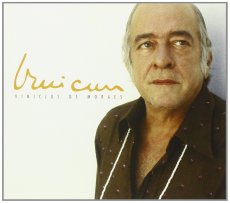
Daily Dose Of Jazz…
Vinicius de Moraes was born Marcus Vinicius de Moraes on October 19, 1913 in Rio de Janiero, Brasil. As a child he was exposed to various musicians and composers and in high school he was writing his first compositions. He went on to graduate college at twenty and published two books of poetry.
Over the next several years he held a variety of banking, government and diplomatic positions while still writing and publishing his poetry. But it wasn’t until the ‘50s that he moved into the realm of pop culture. He studied film festival management, wrote his first samba, contributed lyrics to several classical pieces and in 1956 Vinicius staged his musical play Orfeu da Conceicao that would later become Orfeu Negro or Black Orpheus and win an Academy Award for Best For Language Film in 1959, a British Academy Award and the French Palm d’Or at Cannes.
Collaborating with Antonio Carlos Jobim, Moraes was at the fore when the bossa nova movement began with the release of Elizete Cardoso’s album Cancao do Amor Demais that consisted of the pairs music and a then unknown Joao Gilberto. They went on to compose Garota de Ipanema, Insensitez and Chega de Saudade. Vinicius’ songs would go on to be included in another Cannes winner Un Homme et une Femme (A Man and A Woman) in 1966.
In the 1960s and 1970s, Vinicius continued collaborating with many renowned Brazilian singers and musicians, in particular with Baden Powell venturing into Afro-Brazilian influences that came to be known as collectively as Afro-Sambas. A known bohemian and diplomat, Vinicius also had a problem with alcohol that ultimately had him drummed out of the diplomatic corps by the military regime. But with his new partner, guitarist and singer Toquinho, he continued to realize success on both music and literary landscapes releasing several popular and influential albums.
Vinicius de Moraes, composer, playwright and diplomat nicknamed O Poetinha (The Little Poet), passed away on July 9, 1980 in Rio de Janiero after a long spell of poor health. Hundreds of jazz musicians and performers worldwide have recorded more than 400 of his songs. In 2006 he was reinstated into the diplomatic corps and in 2010 was posthumously promoted to the post of Ambassador by the Brazilian Chamber of Deputies.


